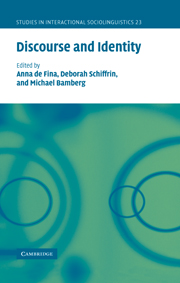Book contents
- Frontmatter
- Contents
- List of contributors
- Introduction
- Part I Overview: theory, method and analysis
- Part II Private and public identities: constructing who we are
- Part III The gendered self: becoming and being a man
- Part IV The in-between self: negotiating person and place
- Editors' introduction
- 13 Group identity, narrative and self-representations
- 14 Performing self, family and community in Moroccan narratives of migration and settlement
- 15 Making it personal: shared meanings in the narratives of Holocaust survivors
- References
- index
14 - Performing self, family and community in Moroccan narratives of migration and settlement
Published online by Cambridge University Press: 09 November 2009
- Frontmatter
- Contents
- List of contributors
- Introduction
- Part I Overview: theory, method and analysis
- Part II Private and public identities: constructing who we are
- Part III The gendered self: becoming and being a man
- Part IV The in-between self: negotiating person and place
- Editors' introduction
- 13 Group identity, narrative and self-representations
- 14 Performing self, family and community in Moroccan narratives of migration and settlement
- 15 Making it personal: shared meanings in the narratives of Holocaust survivors
- References
- index
Summary
The desert-like world commands life to be lived like a pilgrimage. But because life is a pilgrimage, the world at the door-steps is desert-like, featureless, as its meaning is yet to be brought into it by the wandering which would transform it into the track leading to the finishing line where the meaning resides. This “bringing-in” of meaning has been called “identity-building.”
(Z. Bauman 1996: 22)Introduction
Narratives of migration and settlement are narratives in which, almost by definition, settled and stable senses of self are unsettled and challenged. Thus, they confront the discourse analyst and cultural theorist with the task of finding new ways of understanding traditional categories of identity and voice. In this chapter, I use the concepts of speaking position and performance to analyze, in narrative, this unsettling of identities characteristic of migration and diaspora, and I show how narrative has a crucial role in the discursive “bringing-in” of meaning through which the sense of a life is continually made and re-made. The narrative speaking position is necessarily retrospective: to transpose Bauman's words, the narrative of wandering transforms it into discourse, through it speakers articulate retrospectively both their journeys and the senses that can be made of them. Less obviously, the narrative speaking position is also both current and prospective: through narratives speakers construct versions of themselves in current and projected future time.
- Type
- Chapter
- Information
- Discourse and Identity , pp. 376 - 397Publisher: Cambridge University PressPrint publication year: 2006
- 26
- Cited by



